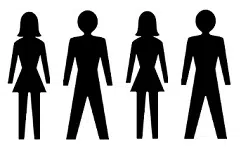The notion of intergender is not included in the dictionary of the Royal Spanish Academy ( RAE ). However, the first thing we are going to do is discover the etymological origin of this term, which was formed from the sum of two Latin lexical components. We are referring to the following:
-The prefix «inter-«, which means «between».
-The noun "genus, generis", which is equivalent to "class", "lineage" or "lineage".
It is possible to approach its definition through the term gender , which has several meanings.
 Coming from the Latin word genus , it can refer to the type or class to which things or individuals belong. In the case of human beings, gender specifically refers to each sex as a whole , taking into account sociocultural aspects and not only the characteristics given by biology.
Coming from the Latin word genus , it can refer to the type or class to which things or individuals belong. In the case of human beings, gender specifically refers to each sex as a whole , taking into account sociocultural aspects and not only the characteristics given by biology.
Currently, the binomial woman / man to refer to gender is outdated, since dozens of gender identities are recognized. It is in this context where the idea of intergender appears.
An intergender person is one who does not perceive themselves as a member of a single "traditional" gender ( woman / man ). When an individual feels that they do not fit into these binary categories, they perceive themselves as intergender.
The intergender subject, therefore, has a gender identity that is usually described as "non-normative." This identity does not recognize the binary meaning of woman/man, but is located in the middle of both categories or in another different place that escapes said classifications.
The concept of intergender can also be mentioned as genderqueer , a name from the English language . These words, in short, refer to the gender identity that is not assimilated into the binary genders (female and male) and that, in this way, is outside of the cisgenders (the gender identity that coincides with the biological sex).
In addition to intergender, we also talk about these other identities:
-Transgender, which is how people define themselves whose gender they belong to is not the same as the one attributed to them when they were born.
-Pangender, which is the one used to refer to people who feel different identities simultaneously and permanently.
-Biggender is, therefore, the person who can identify with both genders and who has the ability to adapt their perception in this regard based on the circumstances that surround them.
-Trigender. This word is the one used to define themselves by those people who feel identified with the masculine and feminine gender, but who also identify with a third gender that can be a combination of those two or simply a null one.
-Agender is the identity assumed by people who do not identify with either of the two main genders, male and female, and who, therefore, are considered "null."
Likewise, in addition to these terms, others are used in terms of gender identity such as cisgender, fluid gender and even the third gender.
